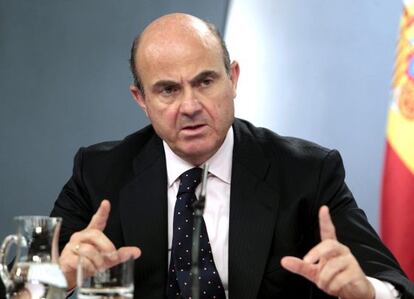Government delays reaching EU deficit target by two years
Economy not expected to grow sufficiently to create jobs until 2015

The government on Friday unveiled a new budget stability plan that includes delaying bringing the budget deficit back within the European Union ceiling of 3 percent of GDP by two years.
The measures unveiled after Friday’s regular Cabinet meeting included extending a hike in personal income tax for another year and a revision of the government’s macroeconomic forecast to show a much deeper recession this year than previously estimated. It sees the economy growing at a sufficient clip to create employment only in 2015, a year later than had been projected.
The administration of Prime Minister Mariano Rajoy plans to reduce last year’s deficit of 10.6 percent – a figure that includes the European bailout to clean up the country’s banks – to 6.3 percent this year, 5.5 percent in 2014, and 4.1 percent in 2015, before complying with the EU ceiling in 2016, when the shortfall is expected to come in at 2.7 percent.
Public debt is expected to peak at 99.8 percent of GDP in 2016, although the IMF sees this figure being reached a year earlier. Debt is seen rising to 91.4 percent of GDP this year, to 96.2 percent in 2014 and 99.1 percent in 2015.
The government now expects the economy to shrink by 1.3 percent this year when it previously forecast a decline of 0.5 percent. Growth is expected to return in 2014, when GDP is seen advancing 0.5 percent. It will only be in 2015, when activity is projected to advance 2.4 percent, that jobs will be created. The pace of growth is expected to accelerate to 3.1 percent in 2016.
Unemployment, the main bane of the current crisis, is expected to average 27.1 percent this year. In the first quarter alone, the jobless rate had already risen to a record 27.2 percent, with the number of people out of work climbing above six million for the first time ever.
Unemployment is expected to slow to 26.7 percent in 2014, 25.8 percent in 2015 and 24.8 percent in 2016, meaning that Rajoy will end his mandate with more unemployment than when he took office.
The new forecasts will be sent to Brussels for approval. The earlier plan agreed with the European Commission called for Spain to bring its deficit down to 2.8 percent of GDP in 2014. However, the economy has slipped back into recession for the second time in barely four years, making the previous pledges unrealistic.
“The new assumptions are extremely conservative, very prudent, very cautious to bring credibility to the government’s performance,” Economy Minister Luis de Guindos said at a news conference, at which he was flanked by Deputy Prime Minister Soraya Sáenz de Santamaría and Finance Minister Cristóbal Montoro.
The new macroeconomic scenario also cuts the country’s regions some slack in their contribution to bring down the deficit. Instead of a target of 0.7 percent of GDP for this year, the regions will now be expected to trim the shortfall to 1.2 percent of GDP from 1.8 percent last year. However, it remains to be seen how the burden is to be shared out among the regions. “The departure points of the regions are very different,” Montoro said.
Montoro said there is “room to increase” special taxes, but ruled out further hikes in fuel levies, which he said were already very high. The minister said some of the tax deduction afforded to companies would also be removed.
The hike in personal income tax announced by Rajoy just after taking office at the end of 2011 was meant to be in place for only two years. However, Montoro said removing the hike before 2014 was not “feasible.”
Montoro ruled out further hikes in major levies such as the value-added and corporate tax rates. “We are not going to raise VAT, which has already been hiked because it was necessary to do so,” the minister. “The consequences of the hike have not run their course.”
A number of the reforms accompanying the new macroeconomic scenario had already been flagged, including the creation of an independent body to ensure compliance with the fiscal targets that have been set. One novelty was the abandoning of the indexation of some public prices from inflation.
Tu suscripción se está usando en otro dispositivo
¿Quieres añadir otro usuario a tu suscripción?
Si continúas leyendo en este dispositivo, no se podrá leer en el otro.
FlechaTu suscripción se está usando en otro dispositivo y solo puedes acceder a EL PAÍS desde un dispositivo a la vez.
Si quieres compartir tu cuenta, cambia tu suscripción a la modalidad Premium, así podrás añadir otro usuario. Cada uno accederá con su propia cuenta de email, lo que os permitirá personalizar vuestra experiencia en EL PAÍS.
¿Tienes una suscripción de empresa? Accede aquí para contratar más cuentas.
En el caso de no saber quién está usando tu cuenta, te recomendamos cambiar tu contraseña aquí.
Si decides continuar compartiendo tu cuenta, este mensaje se mostrará en tu dispositivo y en el de la otra persona que está usando tu cuenta de forma indefinida, afectando a tu experiencia de lectura. Puedes consultar aquí los términos y condiciones de la suscripción digital.








































